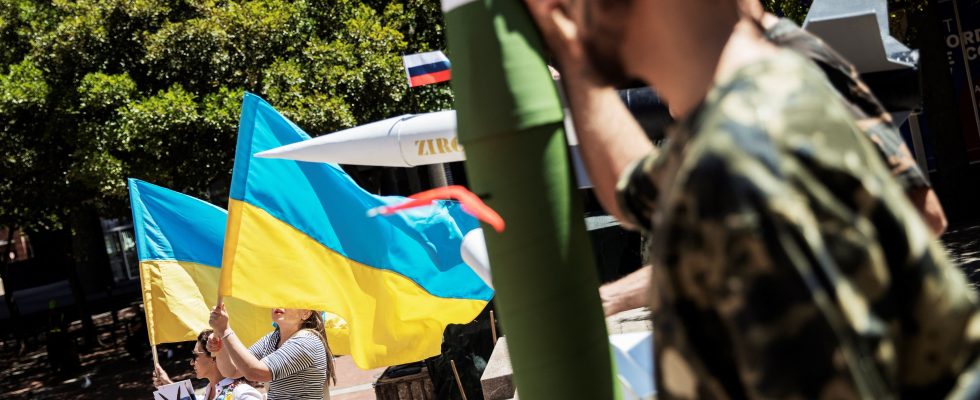“Faced with such a tragedy, Africa cannot remain silent or indifferent,” said Congolese President Denis Sassou Nguesso on Monday, referring to the conflict in Ukraine. With six other heads of state from the African continent, including the president of the African Union, he is part of a mission which is due to go to Kiev on Friday June 16, and to Moscow on Saturday 17, to meet Volodymyr Zelensky then Vladimir Poutine.
But behind concerns about cereal imports, there is also South Africa’s desire to solidify its relationship with Russia and its position on the African scene.
Who makes up the delegation?
The delegation could be made up of the presidents of South Africa (Cyril Ramaphosa), Congo-Brazzaville (Denis Sassou Nguesso), Senegal (Macky Sall), Uganda (Yoweri Museveni), Zambia (Hakainde Hichilema ), Egypt (Abdel Fattah al-Sissi) and Comoros (Azali Assoumani), present in his capacity as current president of the African Union, a Congolese diplomatic source told AFP a few days ago. .
How was this initiative born?
It was South Africa that last May proposed a mediation and peace mission to “find a peaceful solution” to the war in Ukraine. The proposal was endorsed by Vladimir Putin and Volodymyr Zelensky. The appointment was confirmed on June 7 by a communicated published by the Brazzaville Foundation.
On the issue of the Russian-Ukrainian conflict, the African continent has so far found it difficult to speak with one voice. During the last vote at the United Nations for the end of the war in Ukraine and the withdrawal by Russia of its troops, Mali and Eritrea gave their votes against, and many African countries abstained – including South Africa, Congo-Brazzaville and Uganda, Senegal being absent.
According to the South African president, Washington and London would have brought a “cautious” support to the African mission. The Secretary General of the United Nations, Antonio Guterres, “welcomed” the African mission project, believes Cyril Ramaphosa. Antonio Guterres, however, considered that the peace negotiations were “not possible at this time”, the two parties being “convinced that they can win”.
What do participating countries want?
On paper, the stated objective is to deliver “a message of peace, at least of appeasement” to “make the belligerents understand the suffering caused by this war to the weak peoples of the world and in particular to the peoples of Africa. “, according to the Congolese president questioned Monday by AFP.
It must be said that African countries have been particularly affected by the rise in grain prices caused by the Russian invasion of Ukraine, a major exporter of wheat and other agricultural products. More generally, the continent has also suffered from the war on global trade.
Meeting virtually in early June, the participating African countries “agreed to propose elements” to Russia and Ukraine “for a ceasefire and lasting peace in the region”, according to a press release from the President’s office. South African, in order to “finalize the elements of a roadmap towards peace”.
“We will be able to give our own point of view as Africans on how we perceive the impact of this war on Africa in terms of food prices, grain and fuel prices, as well as on Europe and the rest of the world because it has become a rather globalized type of conflict”, also indicated the South African head of state Cyril Ramaphosa. But for his country, it seems that it is also a question of strengthening its position on the African scene and its relationship with Moscow.
What role does South Africa play?
Because if a country will be particularly scrutinized during these meetings, it is this one South Africa is trying to deny the accusations that it supports Moscow, which it has refused to condemn since the start of the conflict in Ukraine . Pretoria claims to remain “neutral” and favor dialogue, a response that is struggling to convince on the international scene. The two countries have maintained a close relationship since the era of the struggle against apartheid.
Tensions escalated last month when the US ambassador in Pretoria accused the South African government of delivering weapons to Russia via a cargo ship that docked in Cape Town, in violation of US sanctions against Moscow . In response, several American elected officials have launched an appeal aimed at sanctioning Pretoria.
South Africa is also facing another diplomatic challenge to decide on the list of invitees to the summit of the BRICS group (Brazil, Russia, India, China, South Africa) organized in August in Johannesburg. The Brics group, formed in 2011, brings together mainly large emerging countries and seeks to counterbalance the traditional domination of the United States and Europe on the international scene. Vladimir Putin, one of the guests of the meeting, is targeted by an arrest warrant issued by the International Criminal Court for “deportation” of Ukrainian children, which normally obliges South Africa, member of the ICC, to arrest him when he arrives on his soil. To avoid this, an alternative is being considered: simply move the summit to China.
But about the visit to kyiv and Moscow, the specific proposals of African countries have not yet been disclosed. “They want to talk to us and we can’t wait to receive them in kyiv”, explained the head of Ukrainian diplomacy Dmytro Kuleba to the African press at the beginning of June. “Talking with them matters to us. But if you want to talk about a specific plan that these African leaders have come up with, if they have one, they haven’t shared it with us so far.”
